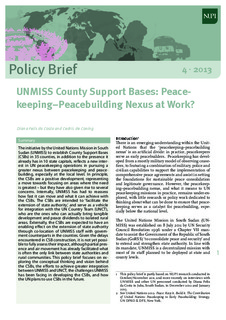UNMISS County Support Bases: Peacekeeping–Peacebuilding Nexus at Work?
Research report
Permanent lenke
http://hdl.handle.net/11250/191550Utgivelsesdato
2013Metadata
Vis full innførselSamlinger
- NUPI Policy Brief [232]
- Publikasjoner fra Cristin - NUPI [1429]
Sammendrag
The initiative by the United Nations Mission in South
Sudan (UNMISS) to establish County Support Bases
(CSBs) in 35 counties, in addition to the presence it
already has in 10 state capitals, reflects a new interest
in UN peacekeeping operations in pursuing a
greater nexus between peacekeeping and peacebuilding,
especially at the local level. In principle,
the CSBs are a positive development, representing
a move towards focusing on areas where the need
is greatest – but they have also given rise to several
concerns. Internally, UNMISS has had to reassess
how fast it can move and what it can achieve with
the CSBs. The CSBs are intended to ‘facilitate the
extension of state authority’, and serve as a vehicle
for integration with the UN Country Team (UNCT),
who are the ones who can actually bring tangible
development and peace dividends to isolated rural
areas. Externally, the CSBs are expected to have an
enabling effect on the extension of state authority
through co-location of UNMISS staff with government
counterparts in the counties. Given the delays
encountered in CSB construction, it is not yet possible
to fully assess their impact, although partial presence
and air movement has already facilitated what
is often the only link between state authorities and
rural communities. This policy brief focuses on exploring
the conceptual thinking and vision behind
the CSBs, the efforts to achieve greater integration
between UNMISS and UNCT, the challenges UNMISS
has been facing in developing the CSBs, and how
the UN plans to use CSBs in the future.
